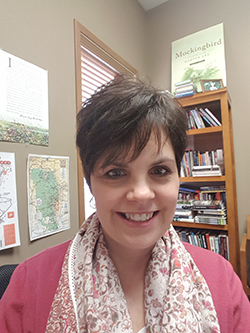

Jennifer Widman
South Dakota Center for the Book/South Dakota Humanities Council
Tell us a bit about yourself, the organization you represent, and the work you do.
Since July 2012, I have been the director of the South Dakota Center for the Book, which is an affiliate of the Center for the Book in the Library of Congress and is housed in the South Dakota Humanities Council. The mission of SDCB is to celebrate the written word in South Dakota, extol the rich heritage of the state and encourage authorship, literacy and reading. This dovetails perfectly with the mission of SDHC, which is to celebrate literature, promote civil conversation and tell the stories that define our state. I am the only staff member of SDCB; however, the four other SDHC employees and I work together on literary programming for both entities.
Tell us about your community/the communities you serve, and your part of the country.
Both organizations, SDCB and SDHC, serve the entire 400-mile-wide state. Our population is concentrated on either edge of South Dakota, with the rural remainder dotted with small towns, family farms (mostly East River—with the Missouri acting as a rough dividing line) and large ranches (mostly West River). About 10 percent of the state’s residents are Native American, and South Dakota is home to nine reservations for the Lakota, Dakota and Nakota people. Otherwise, the state’s racial diversity is limited, but the financial disparity is significant, with two of the nation’s 10 poorest counties located inside our borders. Considering the challenges of geography and income for so many residents, we strive to provide as many free and low-cost opportunities for cultural enrichment through the humanities as possible.
What did it mean to you and your community to host the U.S. Poet Laureate?
It was an honor to host Tracy in South Dakota’s beautiful Black Hills, particularly in some smaller towns that don’t get frequent visits from world-class writers in any genre, much less poets. The opportunity not only to hear the Poet Laureate read and speak, but also to talk directly with her, sharing personal reactions and gaining a new perspective on the countless ways of understanding and interacting with any given poem, was so valuable. I think poetry gained a few new fans in South Dakota, and I know Tracy did!
Can you share any feedback you received from event attendees/participants?
The attendees were effusive in their feedback, both on written surveys and in casual conversations. They praised Tracy’s poetry, of course, but they especially appreciated her warm and open approach to guiding conversations about the poems in her anthology. One of my favorite comments came from an audience member who felt that they had been a part of “co-creating” a unique experience with Tracy.
What, if any, type of literary programming do you present in your community? How did this program fit in?
Our flagship event is the South Dakota Festival of Books, which takes place each fall on alternating sides of the state and features more than 60 national and regional authors who participate in readings, workshops, book signings and special events over the course of four days or more. Our other major literary project is the One Book South Dakota program, which involves discussions of the chosen book in communities around the state, facilitated through our lending library and speakers bureau, culminating in an appearance by the One Book author at the Festival. We also present versions of these programs for young readers; over the past five years, we have given away more than 20,000 books to elementary students and created special author/illustrator events for youth in schools and at cultural centers. Finally, we support local author talks, writing workshops, book discussions, and more on an ongoing basis.
